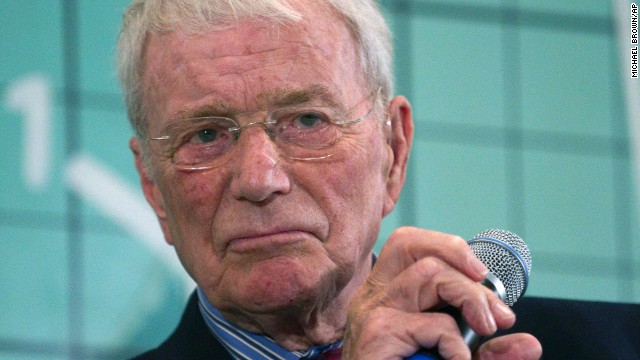
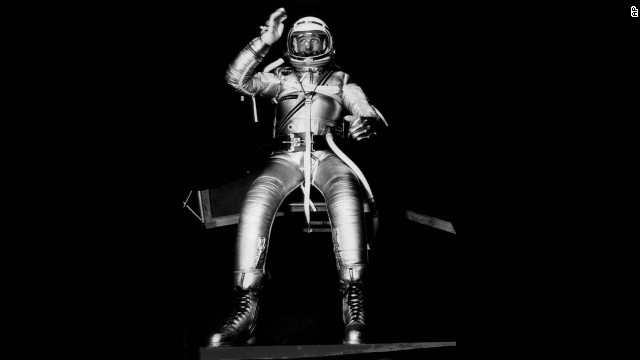 (On the inset)Carpenter, one of
seven men being trained for space flight, tests the mobility of a full
pressure suit being developed for use by the Project Mercury trainees.
The suit was a prototype designed to protect the astronauts from heat
and pressure conditions expected to be encountered during flight. The
tests were conducted at the Navy Air Material Center in Philadelphia,
Pennsylvania, on November 23, 1959.
(On the inset)Carpenter, one of
seven men being trained for space flight, tests the mobility of a full
pressure suit being developed for use by the Project Mercury trainees.
The suit was a prototype designed to protect the astronauts from heat
and pressure conditions expected to be encountered during flight. The
tests were conducted at the Navy Air Material Center in Philadelphia,
Pennsylvania, on November 23, 1959. 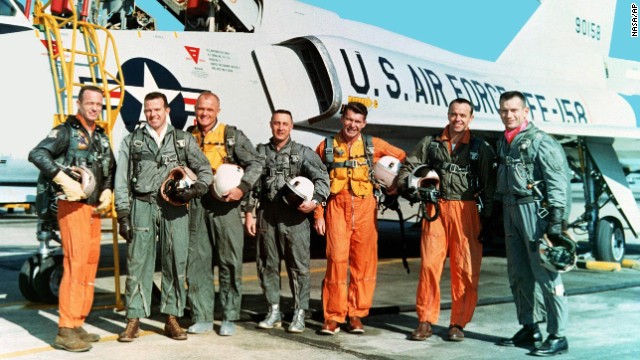 The original seven
Mercury astronauts are shown in their flight suits during training at
NASA Langley Research Center in March 1961. From left: Lt. Carpenter,
Capt. Gordon Cooper, Col. John H. Glenn Jr., Capt. Virgil "Gus" Grissom,
Lt. Cmdr. Walter Schirra, Lt. Cmdr. Alan B. Shepard Jr. and Capt.
Donald K. "Deke" Slayton.
The original seven
Mercury astronauts are shown in their flight suits during training at
NASA Langley Research Center in March 1961. From left: Lt. Carpenter,
Capt. Gordon Cooper, Col. John H. Glenn Jr., Capt. Virgil "Gus" Grissom,
Lt. Cmdr. Walter Schirra, Lt. Cmdr. Alan B. Shepard Jr. and Capt.
Donald K. "Deke" Slayton. 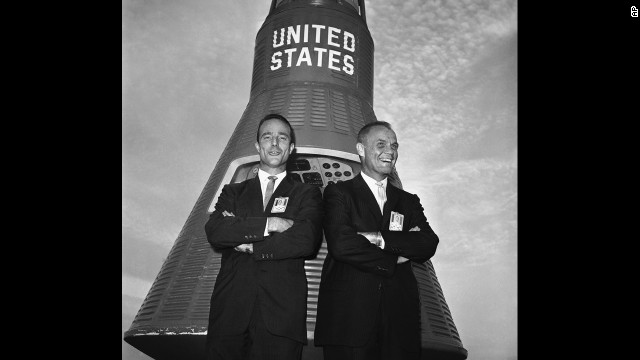 Glenn, right, and
Carpenter in front of a Mercury Capsule after Glenn was named to make
the country's first manned orbital flight, on November 29, 1961, in Cape
Canaveral, Florida. Carpenter was chosen as his backup pilot.
Glenn, right, and
Carpenter in front of a Mercury Capsule after Glenn was named to make
the country's first manned orbital flight, on November 29, 1961, in Cape
Canaveral, Florida. Carpenter was chosen as his backup pilot. 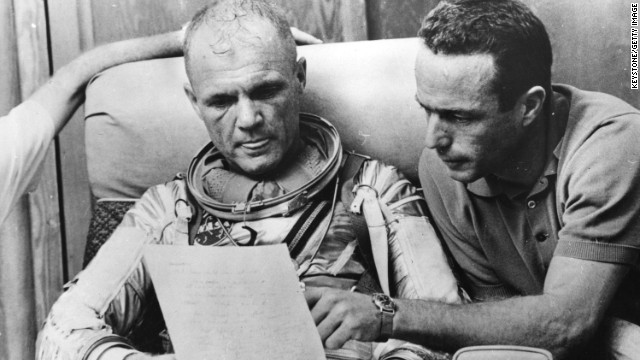 Glenn, left, checks
over notes with back-up pilot Carpenter after a simulated flight before
the Mercury-Atlas 6 mission at Cape Canaveral in 1962. Astronaut Scott Carpenter, the second American to orbit Earth, died Thursday, NASA said. He was 88.
Glenn, left, checks
over notes with back-up pilot Carpenter after a simulated flight before
the Mercury-Atlas 6 mission at Cape Canaveral in 1962. Astronaut Scott Carpenter, the second American to orbit Earth, died Thursday, NASA said. He was 88.
"We have lost a true
pioneer. I shall long remember him not only for his smarts and courage
but his incredible humor. He kept us all grounded," said NASA
Administrator Charlie Bolden. "We will miss him greatly."
Carpenter was one of the
original Mercury 7 astronauts chosen by NASA, which said he died from
complications after a stroke. He was a backup pilot for John Glenn ahead
of America's first manned orbital space flight in February 1962.
Carpenter flew the second
American manned orbital flight in May of that year. Flight time was
four hours and 54 minutes, according to a NASA biography.
NASA celebrates 50 years in orbit
Astronaut Scott Carpenter, the second American to orbit Earth, died Thursday, NASA said. He was 88.
"We have lost a true
pioneer. I shall long remember him not only for his smarts and courage
but his incredible humor. He kept us all grounded," said NASA
Administrator Charlie Bolden. "We will miss him greatly."
Carpenter was one of the
original Mercury 7 astronauts chosen by NASA, which said he died from
complications after a stroke. He was a backup pilot for John Glenn ahead
of America's first manned orbital space flight in February 1962.
Carpenter flew the second
American manned orbital flight in May of that year. Flight time was
four hours and 54 minutes, according to a NASA biography.
NASA celebrates 50 years in orbit
Carpenter's spacecraft overshot its landing target by some 250 nautical miles, giving rise to fears about his fate.
With Carpenter's death,
Glenn is the lone survivor of the Mercury 7, which included Carpenter,
Glenn, L. Gordon Cooper, Virgil "Gus" Grissom, Walter Schirra, Alan
Shepard and Donald "Deke" Slayton.
Soviet cosmonaut Yuri Gagarin was the first person to orbit Earth in April 1961.
'Pioneer' of inner and outer space
Carpenter was born in
Boulder, Colorado, and attended the University of Colorado, where he
studied aeronautical engineering. He retired from the Navy in 1969,
after some two decades of service.
Post-NASA, Carpenter
explored underwater environments as an aquanaut in the Navy's Man in the
Sea Project -- at one point living and working on the ocean floor for
30 days straight. He later served as director of the Navy's aquanaut
operations.
"I still can't make up
my mind whether I like outer or inner space better," Carpenter said last
year -- adding with a smile, "But there's a difference in glory."
Carpenter's memoir, "For
Spacious Skies: The Uncommon Journey of a Mercury Astronaut," was
published in 2003. He also wrote two novels.
"He was one of the good
guys and a good friend, a pioneer who made significant contributions to
our country," said Dick Gordon, command module pilot for Apollo 12 Photos: People we lost in 2013
Carpenter's spacecraft overshot its landing target by some 250 nautical miles, giving rise to fears about his fate.
With Carpenter's death,
Glenn is the lone survivor of the Mercury 7, which included Carpenter,
Glenn, L. Gordon Cooper, Virgil "Gus" Grissom, Walter Schirra, Alan
Shepard and Donald "Deke" Slayton.
Soviet cosmonaut Yuri Gagarin was the first person to orbit Earth in April 1961.
Carpenter was born in
Boulder, Colorado, and attended the University of Colorado, where he
studied aeronautical engineering. He retired from the Navy in 1969,
after some two decades of service.
Post-NASA, Carpenter
explored underwater environments as an aquanaut in the Navy's Man in the
Sea Project -- at one point living and working on the ocean floor for
30 days straight. He later served as director of the Navy's aquanaut
operations.
"I still can't make up
my mind whether I like outer or inner space better," Carpenter said last
year -- adding with a smile, "But there's a difference in glory."
Carpenter's memoir, "For
Spacious Skies: The Uncommon Journey of a Mercury Astronaut," was
published in 2003. He also wrote two novels.
"He was one of the good
guys and a good friend, a pioneer who made significant contributions to
our country," said Dick Gordon, command module pilot for Apollo 12
No comments:
Post a Comment